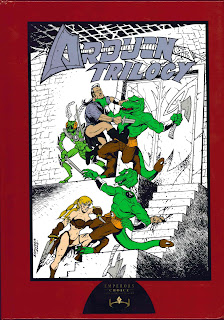It has been too long since I last visited the world of Arduin, certainly one of the most magikal places in the adventure gaming multiverse.
Arduin is everywhere. (It says so in the book!)
Arduin is full of ideas, inspiration and enthusiasm for the hobby.
The possibilities are limited only by what you can imagine.
As for the corporate side of the hobby, well the less said these days, the better. (and I don't desire to add to the "differences of opinion" by restating mine)
And then there is my disagreement with friends over "stuff" - everything from "what system to play" to who is, or is not, to blame for whatever ills we personally put front and center in our general "talking points" (anger is not a fun emotion to experience or to witness). Ho-Hum, and a sad sigh of despair...
Arduin began life as the personal game world of David Hargrave during the early days of the hobby, before there was an attempt to codify and control how people played the game. It is an artifact of its time, yet it remains relevant today. The publications have evolved and content has been added to by others who were inspired by the creativity of Mr. Hargrave. I consider myself fortunate - I have entered the nexus gates through the pages of Arduin many times.
I have yet to find the outer limits of the creative imaginings contained within Arduin. Each journey to Arduin reveals new territory and is a fantastic discovery. Casting about online, I know mine is not a unique experience and others have encountered similar feelings. If you would journey forth through the gates to Arduin, you will find it is only a mouse click or two away. Many of the grimoires remain available, kept alive by a devoted following.
Hence, I find myself casting about, searching for something to bring me cheer.
Enter Arduin...the off-the-rails imaginings of a free-spirited gamemaster, first published 40 years ago the words expressed in the pages of the Arduin Grimoire always seem fresh and full of excitement. For its multitude of possibilities, upbeat mood and fresh ideas that are brought into our hobby through its magikal "gates". A quick perusal of even one grimoire will reveal many ideas that first appeared in the pages of Arduin's "Grimoires" and have later reappeared in the wider hobby. Innovation!
Arduin began life as the personal game world of David Hargrave during the early days of the hobby, before there was an attempt to codify and control how people played the game. It is an artifact of its time, yet it remains relevant today. The publications have evolved and content has been added to by others who were inspired by the creativity of Mr. Hargrave. I consider myself fortunate - I have entered the nexus gates through the pages of Arduin many times.
I have yet to find the outer limits of the creative imaginings contained within Arduin. Each journey to Arduin reveals new territory and is a fantastic discovery. Casting about online, I know mine is not a unique experience and others have encountered similar feelings. If you would journey forth through the gates to Arduin, you will find it is only a mouse click or two away. Many of the grimoires remain available, kept alive by a devoted following.
Each time I delve into Arduin I find it to be renewing, and energizing, and captivating. The genius of David Hargrave flows forth across the multiverse and seems timeless. What a gift!


.jpg)






.jpg)
.jpg)

